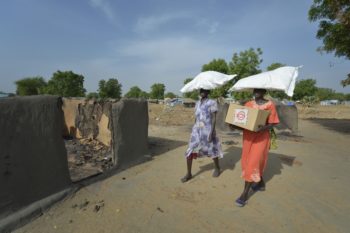
How might the wars in Mali, South Sudan and Somalia be impacted if climate change was no longer an issue? While it is impossible to know precisely, climate scientists have identified disturbing links between climate change and conflict.
People living in fragile contexts are struggling to survive as climate-related threats intensify. It is frightening to see how drastic shifts in weather patterns result in severe drought, which is often followed by flooding. Extreme environmental change is decimating crops, water reserves and is wreaking havoc in local economies. Disputes over the control of arable land and water sources may also lead to increased violence and conflict many fragile states.
As the International Security Conference kicks off in Munich today, state leaders, ministers and experts will meet to discuss the anticipated global threats to international security and ways to overcome them. While there are many factors at the local and international level that affect conflict, there is a growing realisation that the global temperature rise must be addressed to prevent further violence and to sustain peace.
While the threats posed by climate change are extremely worrying, there is a silver lining worth noting in the context of conflict. The reality is that many drivers of conflict, such as historical, ethnic or religious relationships, or the struggle for power are difficult to influence and there are no straightforward solutions. However, once leaders recognise that climate change is a potential driver of violent conflict that must be addressed, they will find that there are concrete and immediate measures that can be put in place to address it.
We know that in the coming years climate change will have dramatic consequences on countries south of the Sahara as less rainfall and more heatwaves will make it challenging to sustain agricultural activities. This reality and potential source of conflict could be addressed in two ways. One way is that massive investments could be made towards climate adaptation using technologies and new farming methods to enable communities to develop and grow crops even if the climate is changing.
Alternatively, the changing conditions could be accepted and efforts could instead be directed towards helping people to safely resettle in new areas. While migration has been a common strategy throughout history (sometimes by choice, and other times not), it is not without the risk of violence, social unrest and hardships for those displaced.
There is a need to increase climate finance specifically for countries where climate-related conflicts are looming. Climate finance should not only be scaled up but it should also be carefully considered in terms of how it can best support communities that are most likely to be displaced and suffer from violence. While rich countries could argue that they are already mobilising support, these efforts are lagging and continue to prioritise the needs of emerging economies instead of the poorest and most vulnerable countries where the risk of climate-related conflict is most significant.
I hope that participants at the Munich Security Conference will consider this perspective because climate change is a security threat and needs to be tackled as one immediately.
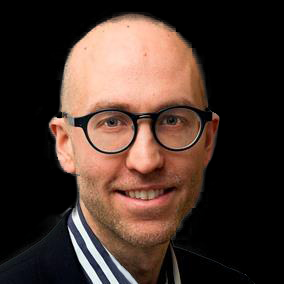 Blog written by Mattias Söderberg (@Mattias_S). Senior advocacy adviser at DanChurchAid. Mattias currently serves as the co-chair of ACT’s Climate Change Working Group.
Blog written by Mattias Söderberg (@Mattias_S). Senior advocacy adviser at DanChurchAid. Mattias currently serves as the co-chair of ACT’s Climate Change Working Group.
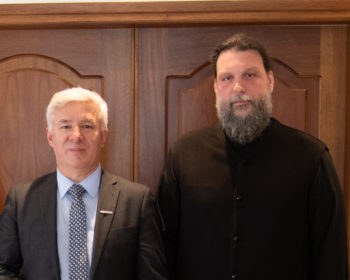 One of the key issues that was discussed during the ACT Secretariat meetings in Athens, Greece at the beginning of February was migration and displacement. As one of the key thematics of the ACT global strategy, migration and displacement is an area of focus for many members around the world, from North America to Asia, Africa to MENA, and Latin America to Europe.
One of the key issues that was discussed during the ACT Secretariat meetings in Athens, Greece at the beginning of February was migration and displacement. As one of the key thematics of the ACT global strategy, migration and displacement is an area of focus for many members around the world, from North America to Asia, Africa to MENA, and Latin America to Europe.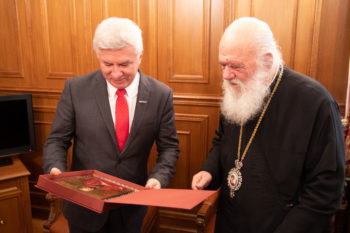 ACT members have responded to the needs of migrants since 2015 through members of the ACT Europe Forum, and through Apostoli, the Archdiocese’s agency for Mission.
ACT members have responded to the needs of migrants since 2015 through members of the ACT Europe Forum, and through Apostoli, the Archdiocese’s agency for Mission.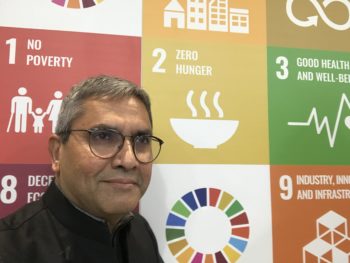 medBlog is written by Dr. Manoj Kurian, Coordinator, World Council of Churches- Ecumenical Advocacy Alliance
medBlog is written by Dr. Manoj Kurian, Coordinator, World Council of Churches- Ecumenical Advocacy Alliance